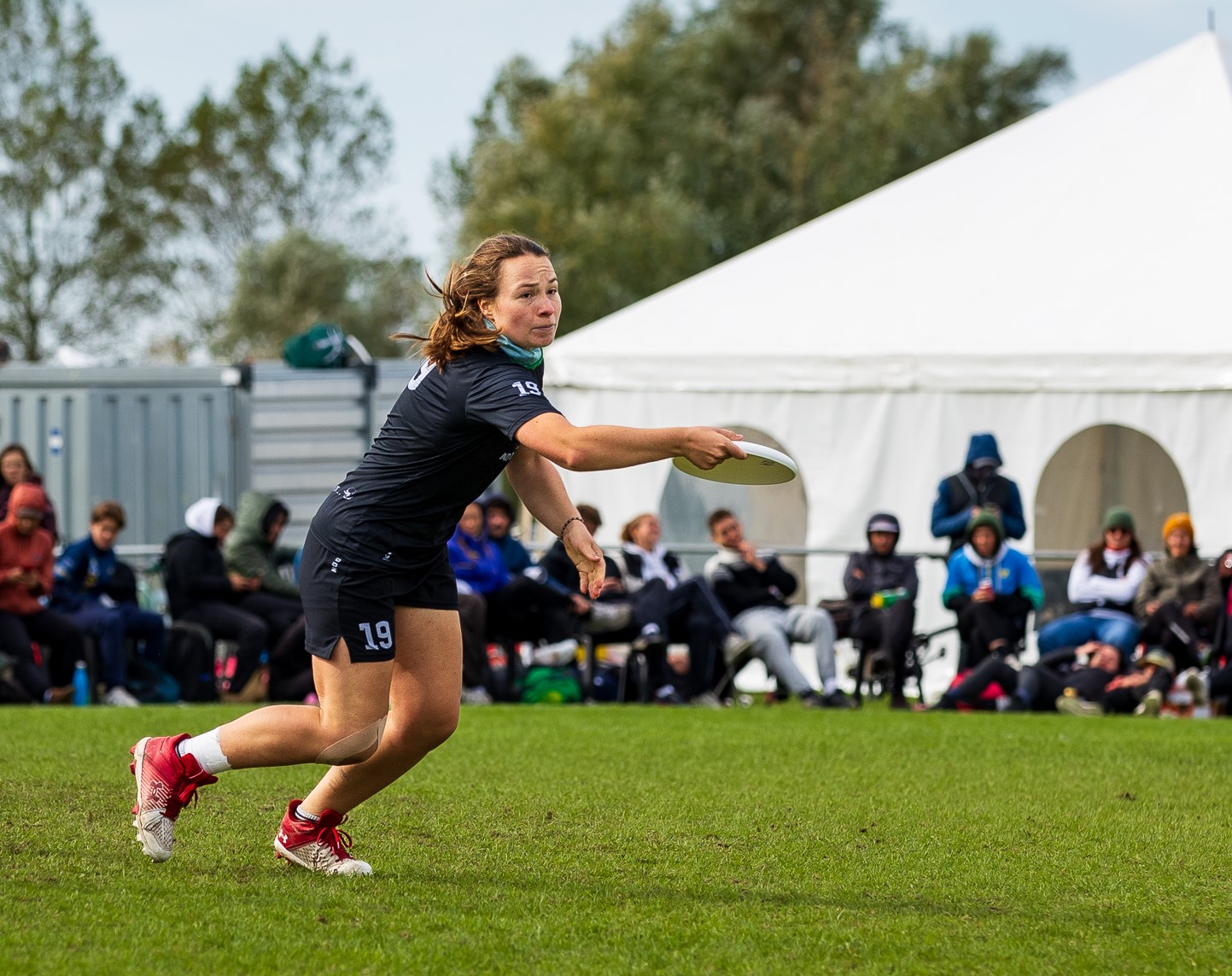Dans la même rubrique
-
Partager cette page
Campus standouts - Maria Belpaire
This month, we’re delighted to introduce Maria Belpaire, a Business Engineering student at Solvay Brussels School and a high-level Ultimate Frisbee player who recently won a silver medal at the European Club Championships.

Tell us about yourself?
My name is Maria Belpaire, I am 23 years old, and I completed my bachelor's degree in Business Engineering at Solvay Brussels School. I am currently finishing my master's in the same field. I am passionate about Ultimate Frisbee, which I play at a high level with the Mooncatchers in Uccle. We recently won the silver medal at the European Club Championships in the women's category. In 2023, I also represented Belgium in the national women’s team at the European Nations Championships. As a coach, I mentor junior players in Uccle and had the opportunity to lead the U17 national women’s team to a European bronze medal. These experiences have allowed me to develop leadership and organisational skills that complement my academic background.
Can you share your academic journey at Solvay Brussels School and discuss the challenges you faced balancing your education with your ultimate frisbee commitments?
I started my studies at Solvay in 2020 and am currently in my final year of a master's degree in Business Engineering. I chose to specialise in sustainability and data analysis, two fields that fascinate me. Through an exchange program at Simon Fraser University in Vancouver, where I am currently studying, I am deepening my knowledge in these disciplines with unique courses that I wouldn’t have had access to in Belgium. This exchange also allows me to continue my sports practice with the local university team, further enriching my experience.
Can you tell us about your journey in Ultimate Frisbee? How did you discover the sport, and what drew you to it?
I have been playing Ultimate Frisbee for almost eight years with the Mooncatchers in Uccle. I discovered the sport thanks to my brother, who was the first to start playing. The turning point came when I accompanied him to a junior European championship and saw European women’s teams, including Belgium. This sport immediately captivated me with its intensity, physical demands, and technical aspects. But what makes it unique is that it is mixed-gender, non-contact, and, most importantly, self-officiated, emphasising sportsmanship and fair play.
How does the university, particularly Solvay Brussels School, support students balancing both academics and high-level sports? What initiatives or resources are available (such as schedule adjustments, tailored programs, or exam flexibility)?
Since my training sessions take place in the evenings (8 PM - 10 PM), I have been able to balance my studies and sport, though it sometimes requires strict time management. The university, and more specifically the Solvay faculty and professors, have always been understanding when I needed to be absent for competitions. This flexibility has been invaluable in managing both my sports and academic commitments.
If you could introduce a new rule in Solvay Brussels School’s academic structure to improve the lives of student-athletes, what would it be, and how would it benefit everyone?
During my exchange in Canada, I saw firsthand how well student-athletes are supported: access to sports facilities on campus, integrated training schedules, and real recognition of their role. Although the Belgian context is different, it would be beneficial to highlight student-athletes more, for example, through regular communication about their achievements. This would strengthen their sense of belonging and demonstrate that both the faculty and students fully support them. The Campus Standouts initiative is already a great step from the faculty to showcase student-athletes. Thanks to this, I also get to learn about the achievements of my fellow high-level sports peers.
How do you envision integrating your Solvay Brussels School education into your future projects, and vice versa?
My studies at Solvay have provided me with essential skills to contribute to a more sustainable and equitable world. I want to be involved in projects that have a positive impact, whether in sustainability or other sectors. Although I am unsure whether I will work in sports, I am determined to continue developing women's Ultimate in Belgium. The management skills I have acquired at Solvay will help professionalise this sport further and give it the recognition it deserves.
Your team recently won the silver medal at the European Club Championships. As a captain, that must have required a lot of time and effort. How do you balance your studies with training and competitions?
Winning the silver medal at the European Championship was a great achievement, but it required strict time management. As a captain in a sport that is still under-professionalised, I was involved in both the athletic preparation (coaching, strategies, selections) and the logistical organisation (travel, accommodation, planning). My calendar was crucial in planning my weeks and ensuring I worked ahead before competitions. Fortunately, I could always rely on my teammates and classmates to help me manage these busy periods.
What skills have you gained from your sport that are also useful in your academic life?
Ultimate has taught me to take responsibility and manage projects, skills that I apply in my studies. Being a captain and coach has trained me in decision-making, communication, and team management—valuable qualities for group work. Conversely, my studies have also helped me better organise and structure projects within my club.
What advice would you give to other students juggling rigorous academic demands while pursuing a sports career?
I would advise them to take advantage of the diverse network they have through the two worlds they navigate. Like me, they are fortunate to have classmates who are always ready to help them catch up on lessons and who understand their busy schedules. On the other side, their teammates, with their varied experiences, provide mental, academic, and athletic support. Building a strong support network and staying well-organised are essential keys to succeeding in both fields.